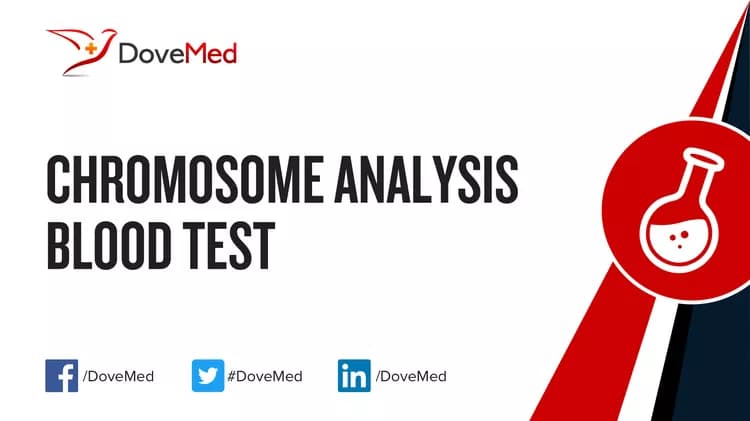What are other Names for this Test? (Equivalent Terms)
- Chromosome Karyotype Blood Test
What is the Chromosome Analysis Blood Test? (Background Information)
- A chromosome is a collection of DNA that represents a portion of an individual’s genetic blueprint. Chromosomal abnormalities give rise to genetic disorders
- DNA is referred to as the genetic blueprint because it provides instructions for proteins that eventually provide the structure and chemical reaction machinery necessary to make a living organism. Functional parts of the genome are called genes
- All of the genetic information needed for protein production is given on 23 chromosomes. Each chromosome is unique. The collection of all of the chromosomes is called a genome. Chromosomes are housed in a cell’s nucleus.
- Most human cells contain 2 copies of their genome. This makes 46 chromosomes. Exceptions are sperm and egg cells, which have only 1 copy of their karyotype (23 chromosomes) and red blood cells, which contain no nucleus and thus no genetic material
- 2 of the 23 chromosomes are essential to determination of sex. They are called sex chromosomes. In women, these chromosomes are identical (XX) while in men they are different (XY)
- Even though cells specialize to form different tissues and organs, such as the liver and kidneys, they all possess genetic information needed to make the entire organism. However, only the information relevant to the specialized tissue is called upon
- Proteins and other elements regulate the process by which DNA is converted into proteins (called expression). Cells of different tissues express different parts of the genome, which gives them different forms and functions
- Mutations in DNA may occur as a result of environmental agents or during cell division. They may be inconsequential or cause cancer and heritable genetic disorders
- Mutations are only passed from one generation to the next, if they occur in the DNA of sperm or egg cells. Mutations that occur in body cells may cause abnormalities in that cell and all others that divide from it, but not in the offspring
- If mutations occur in genes critical to growth and division, the result may be cancer. However, because most cells have 2 copies of the genome, mutations may partially be compensated for if they only occur on one copy
- Cells have evolved complex mechanisms to prevent and fix genetic errors if they occur. These include programmed cell death. However, these mechanisms are sometimes not enough, and genetic disorders are the unfortunate consequence
- The Chromosome Analysis Blood Test detects abnormalities in an individual’s genetic blueprint. It is used to diagnose genetic disorders such as trisomy 21 (Down’s syndrome), Klinefelter’s syndrome, Turner’s syndrome, and fragile-X syndrome
What are the Clinical Indications for performing the Chromosome Analysis Blood Test?
Following are the clinical indications for performing the Chromosome Analysis Blood Test:
- Screening for genetic disorders of a developing fetus
- Family history of trisomy 21 (Down’s syndrome), Klinefelter’s syndrome, Turner’s syndrome, and fragile-X syndrome
- Abnormal child development
- Infertility
- Amenorrhea
- Frequent miscarriages
How is the Specimen Collected for the Chromosome Analysis Blood Test?
Following is the specimen collection process for Chromosome Analysis Blood Test:
Sample required: Blood
Process of obtaining blood sample in adults:
- A band is wrapped around the arm, 3-4 inches above the collection site (superficial vein that lies within the elbow pit)
- The site is cleaned with 70% alcohol in an outward spiral, away from the zone of needle insertion
- The needle cap is removed and is held in line with the vein, pulling the skin tight
- With a small and quick thrust, the vein is penetrated using the needle
- The required amount of blood sample is collected by pulling the plunger of the syringe out slowly
- The wrap band is removed, gauze is placed on the collection site, and the needle is removed
- The blood is immediately transferred into the blood container, which has the appropriate preservative/clot activator/anti-coagulant
- The syringe and the needle are disposed into the appropriate “sharp container” for safe and hygienic disposal
Preparation required: No special preparation is needed prior to the test.
What is the Significance of the Chromosome Analysis Blood Test Result?
- A positive value for the Chromosome Analysis Blood Test may indicate a genetic disorder, such as trisomy 21 (Down’s syndrome), Klinefelter’s syndrome, Turner’s syndrome, and fragile-X syndrome
The laboratory test results are NOT to be interpreted as results of a "stand-alone" test. The test results have to be interpreted after correlating with suitable clinical findings and additional supplemental tests/information. Your healthcare providers will explain the meaning of your tests results, based on the overall clinical scenario.
Additional and Relevant Useful Information:
- Genetic tests are increasingly performed to identify genetic predispositions to disorders such as Down’s syndrome. This provides valuable information to parents with family histories of genetic disorders so that they may make an informed decision regarding their choice to have children
Certain medications that you may be currently taking may influence the outcome of the test. Hence, it is important to inform your healthcare provider of the complete list of medications (including any herbal supplements) you are currently taking. This will help the healthcare provider interpret your test results more accurately and avoid unnecessary chances of a misdiagnosis.
The following DoveMed website links are useful resources for additional information:
https://www.dovemed.com/diseases-conditions/trisomy-x-syndrome/
http://www.dovemed.com/diseases-conditions/williams-syndrome/
Please visit our Laboratory Procedures Center for more physician-approved health information:
http://www.dovemed.com/common-procedures/procedures-laboratory/
Related Articles
Test Your Knowledge
Asked by users
Related Centers
Related Specialties
Related Physicians
Related Procedures
Related Resources
Join DoveHubs
and connect with fellow professionals


0 Comments
Please log in to post a comment.